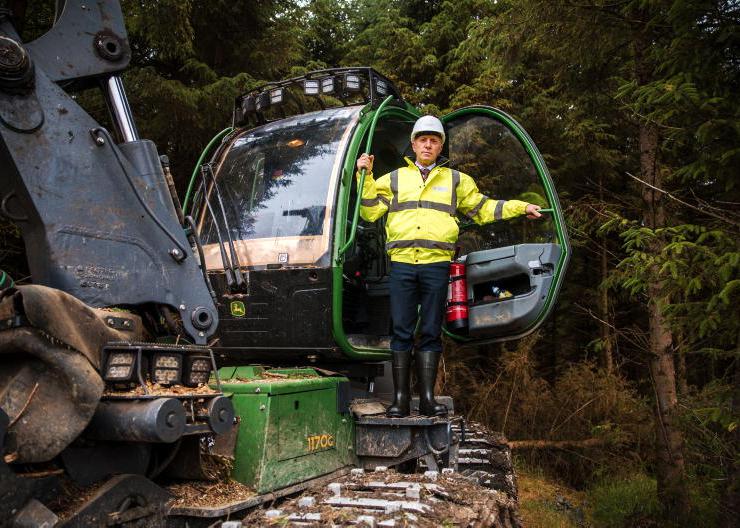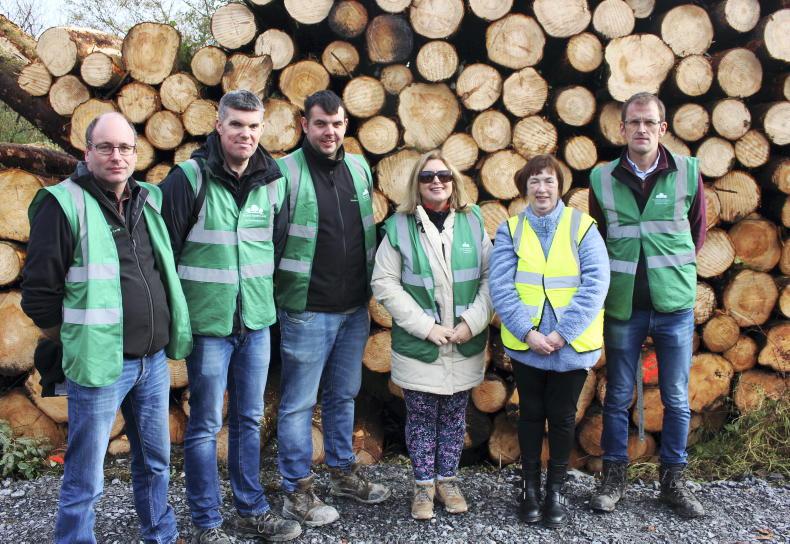The impact of Brexit on Irish forestry was outlined last Thursday when the Irish Timber Industry Development Forum (TIDF) presented its report “Brexit: Protecting Growth in the Irish Timber Industry” to Commissioner Phil Hogan.
Both John Murray of the Murray Timber Group and Fergal Leamy, CEO Coillte provided a number of solutions as well as outlining the vulnerability of the sector.
"The Irish timber industry is uniquely exposed to Brexit, with almost 80% of its output and 100% of future growth, dependant on ongoing access to the UK," was the core message to Commissioner Hogan.
The TIDF represents all the major sawmills and the three panel board mills on the island as Brexit has major implications for timber processors, north and south.
The major negative implications of Brexit on Irish agriculture have overshadowed forestry but the TIDF report stresses the importance of the sector for jobs, the rural economy where it generates "€2.3billion annually" and by implication for up to 20,000 private forest owners – mainly farmers.
Jobs
While the performance of hi-tech companies has been repeatedly highlighted to demonstrate their value to the Irish economy, the role forestry plays in job creation is even more important maintained Fergal Leamy.
"The 12,000 jobs in the forestry and forest products sector exceed the combined total of Google, Facebook, LinkedIn and PayPal in Ireland," he said.
John Murray said the main objective of the report was to offer future trade solutions between Ireland and the UK, but it was also important to highlight the importance of forestry which was "a quiet industry" and not good at promoting itself.
He outlined the logistic disruption that will be caused by Brexit "as Ireland now exports 78% of its outputs which results in 40,000 international truck movements of timber annually".
The problem faced by the TIDF in providing solutions was the lack of clarity on the outcome of EU-UK negotiations.
However the group accepted that "a future trading relationship will never be as seamless as the current arrangement" so analyses and solutions were designed "to ensure that the potential damage inflicted on the Irish timber industry is minimised".
Norway-Sweden model
The report maintains that a "Fre Trade Agreement, Canada-style model remains a likely outcome to the current Brexit negotiations".
Based on this premise, the authors assessed EU-non EU trading models such as currently exist with Canada, Norway and Turkey with solutions that could include:
The adoption of similar practices established on the Norway-Sweden border including interchangeable custom officials. This will require mutual trust and training of border officials and mutual recognition of customs authorities and policing bodies.Advanced authorization mechanisms at the border points with the highest level of crossings by traders facilitating the free flow of goods.Regulatory conformity between both jurisdictions for low risk products including timber.Adoption of the latest technology required for number plate recognition and data collection. Establish best practice in existing tracking and paperless docket systems for wood haulage.Establish a mutually recognised single database for traders that covers all forms of trading data e.g. EU single administrative document (SAD).Implement an Ireland-UK-EU equivalent of the FAST program that exists within the NAFTA agreement to facilitate faster trading for regular cross-border travellers.Continued adherence by the UK to the current EU VAT structure to minimise impact for both Irish and UK businesses.The UK is the largest importer of timber in Europe and continued access to this market is vital according to John Murray.
Virtually all exports comprise Sitka spruce "the Friesian cow of the Irish timber industry," he said.
"The Irish timber industry is important not just to the economy but to the future sustainability of a green and forward looking Ireland," said Fergal Leamy.
"We are set to double in size by 2035 but in order to achieve this growth, we need to urgently address the unique impact of Brexit on the industry.
"We seek to contribute to the Brexit debate by providing practical and innovative solutions to facilitate continued trade flows between Ireland and the UK."
Read more
Forestry payments for 2018 issued to farmers
Brexit impact on UK and global timber trade
The impact of Brexit on Irish forestry was outlined last Thursday when the Irish Timber Industry Development Forum (TIDF) presented its report “Brexit: Protecting Growth in the Irish Timber Industry” to Commissioner Phil Hogan.
Both John Murray of the Murray Timber Group and Fergal Leamy, CEO Coillte provided a number of solutions as well as outlining the vulnerability of the sector.
"The Irish timber industry is uniquely exposed to Brexit, with almost 80% of its output and 100% of future growth, dependant on ongoing access to the UK," was the core message to Commissioner Hogan.
The TIDF represents all the major sawmills and the three panel board mills on the island as Brexit has major implications for timber processors, north and south.
The major negative implications of Brexit on Irish agriculture have overshadowed forestry but the TIDF report stresses the importance of the sector for jobs, the rural economy where it generates "€2.3billion annually" and by implication for up to 20,000 private forest owners – mainly farmers.
Jobs
While the performance of hi-tech companies has been repeatedly highlighted to demonstrate their value to the Irish economy, the role forestry plays in job creation is even more important maintained Fergal Leamy.
"The 12,000 jobs in the forestry and forest products sector exceed the combined total of Google, Facebook, LinkedIn and PayPal in Ireland," he said.
John Murray said the main objective of the report was to offer future trade solutions between Ireland and the UK, but it was also important to highlight the importance of forestry which was "a quiet industry" and not good at promoting itself.
He outlined the logistic disruption that will be caused by Brexit "as Ireland now exports 78% of its outputs which results in 40,000 international truck movements of timber annually".
The problem faced by the TIDF in providing solutions was the lack of clarity on the outcome of EU-UK negotiations.
However the group accepted that "a future trading relationship will never be as seamless as the current arrangement" so analyses and solutions were designed "to ensure that the potential damage inflicted on the Irish timber industry is minimised".
Norway-Sweden model
The report maintains that a "Fre Trade Agreement, Canada-style model remains a likely outcome to the current Brexit negotiations".
Based on this premise, the authors assessed EU-non EU trading models such as currently exist with Canada, Norway and Turkey with solutions that could include:
The adoption of similar practices established on the Norway-Sweden border including interchangeable custom officials. This will require mutual trust and training of border officials and mutual recognition of customs authorities and policing bodies.Advanced authorization mechanisms at the border points with the highest level of crossings by traders facilitating the free flow of goods.Regulatory conformity between both jurisdictions for low risk products including timber.Adoption of the latest technology required for number plate recognition and data collection. Establish best practice in existing tracking and paperless docket systems for wood haulage.Establish a mutually recognised single database for traders that covers all forms of trading data e.g. EU single administrative document (SAD).Implement an Ireland-UK-EU equivalent of the FAST program that exists within the NAFTA agreement to facilitate faster trading for regular cross-border travellers.Continued adherence by the UK to the current EU VAT structure to minimise impact for both Irish and UK businesses.The UK is the largest importer of timber in Europe and continued access to this market is vital according to John Murray.
Virtually all exports comprise Sitka spruce "the Friesian cow of the Irish timber industry," he said.
"The Irish timber industry is important not just to the economy but to the future sustainability of a green and forward looking Ireland," said Fergal Leamy.
"We are set to double in size by 2035 but in order to achieve this growth, we need to urgently address the unique impact of Brexit on the industry.
"We seek to contribute to the Brexit debate by providing practical and innovative solutions to facilitate continued trade flows between Ireland and the UK."
Read more
Forestry payments for 2018 issued to farmers
Brexit impact on UK and global timber trade









SHARING OPTIONS